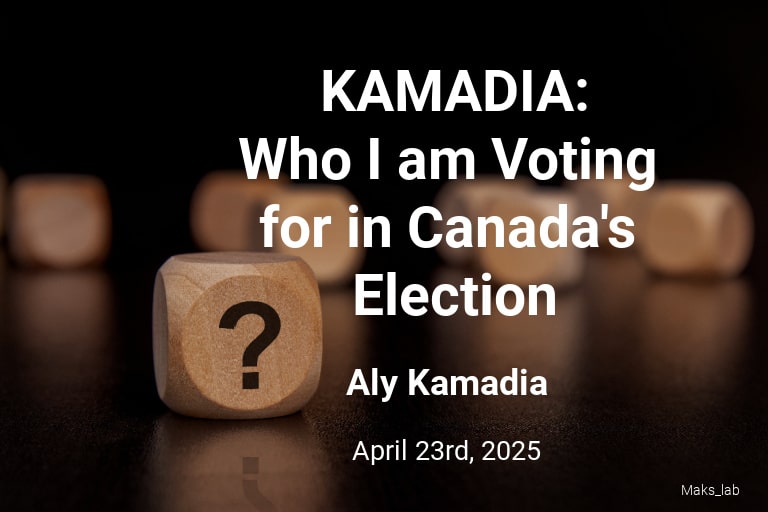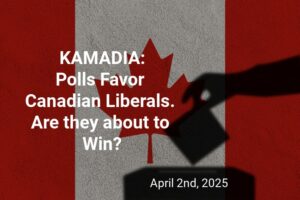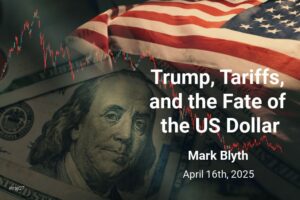By Aly Kamadia, Editor-In-Chief, iDose Magazine
“Politics is too serious a matter to be left to the politicians.” (Unknown author.)
This quote aptly captures the attitude that many skeptics justifiably feel towards politicians.
Even though I’m one such skeptic, the gravity of the current moment demands that both my fellow Canadians and I cast a vote for April 28th’s federal election – if we have not already.
Amid the chaos that US President Donald Trump is unleashing, many Canadians have been gripped by nervousness and fear in recent months. Most are thus evaluating which of the country’s two main political parties is offering a savoir, or which of the two leaders represent the ‘lesser of two evils’, as the saying goes.
Before declaring who I believe to be the clear choice, allow me to take a brief snapshot of the broader context that is defining this historical juncture.
On the international stage, despite Western political and economic elites lecturing the entire world for decades about the inevitable triumph of neoliberal globalization, with some even arguing that it was humanity’s final destination, US-led neoliberalism has taken its last breath. It is entirely dead, without the slightest chance of being resurrected in our lifetimes.
While never quite able to detach itself from a turbulent history (e.g., the forever wars initiated by the US 2003 invasion of Iraq, the historically catastrophic 2008 financial crisis caused by ‘very intelligent’ central bankers, policy makers and fortune 500 executives whose companies would have gone bankrupt without taxpayer bailouts, etc.), some intellectuals were pronouncing neoliberalism’s eulogy before Trump’s 2016 victory.
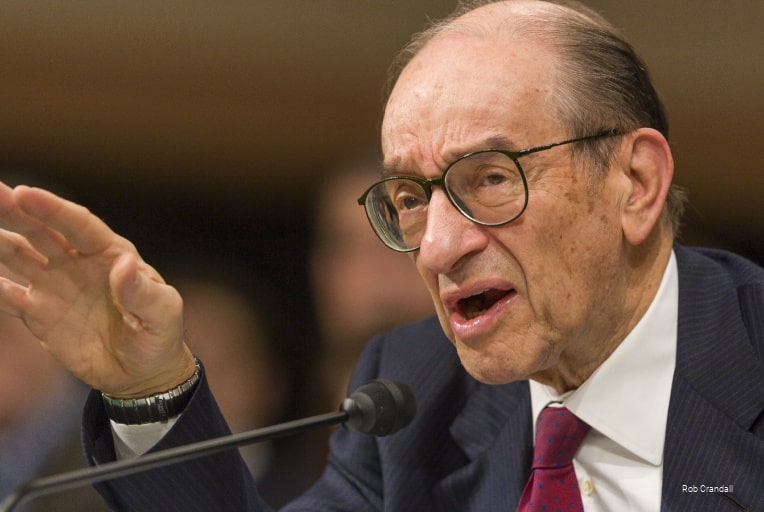
Other intellectuals declared its final heartbeat with the breaking out of the COVID pandemic, while some argued that the final nail in the coffin was hammered in by Trump unleashing historic tariffs against the entire world – including nations where no humans exist, but are apparently populated by penguins.
The needless uncertainty that Trump has created has accelerated American decline (a topic for another commentary), and will have permanent global economic and political consequences.
The next Canadian Prime Minister ought to be someone who can navigate our nation through what may be a long and protracted period of economic turbulence.
This might necessitate a radical recalibration of Canada’s macroeconomic and microeconomic policies. Equally important, it will demand a mind with imagination and flexibility, and not one suffering from a rigid allegiance to fairy tale-like economic beliefs.
A similar sentiment applies to international relations and more specifically, national security.
Yours truly does not agree with intellectuals who believe that the US has already descended into the arms of fascism. But President Trump is waging a serious, full-scale war on America’s democratic institutions. That war is currently being fought on many fronts: against the supreme court, law firms, the media, academia and more.
While there is meaningful domestic resistance to Trump (e.g., the record crowds that Senator Bernie Sanders and Congresswoman Alexandria Ocasio-Cortez are being greeted with in their “Fighting Oligarchy” tour), it remains impossible to forecast how successful or unsuccessful Trump’s efforts will be. Put differently, the idea of America transforming into some sort of authoritarian state remains a plausible scenario.
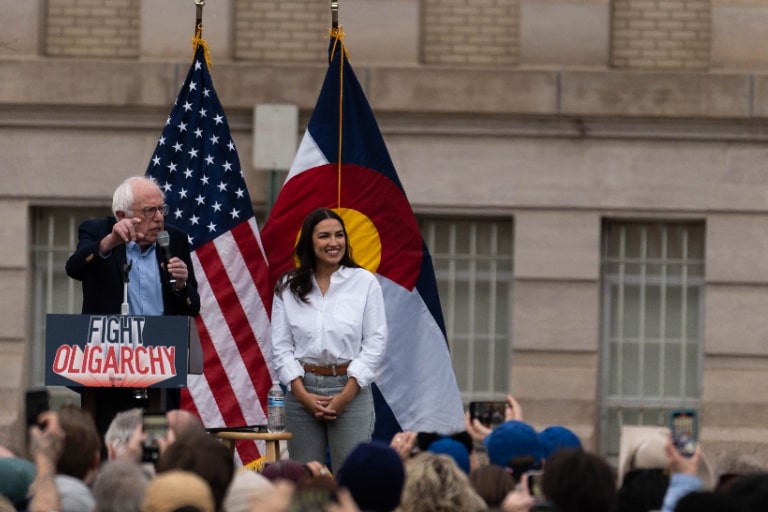
Since our American neighbor also happens to possess the most powerful military witnessed in human history, during a moment when great power politics has returned, it would constitute the height of absurdity for the next Canadian Prime Minister to depend almost exclusively for our nation’s security on the US.
Thankfully, it seems that both the Conservative and Liberal leaderships understand this elementary fact.
The Prime Minister who gets elected on April 28th must fashion concrete strategic accommodations with our European allies to meet Canada’s national security interests. This alone would mark progress, considering that the “last time Canada issued a full foreign policy was 2005”.
There are literally no words to describe how utterly embarrassing this level of stupidity is.
To be fair, lacking to issue a full foreign policy belongs on a long list of failures that rest at the feet of many Canadian political and economic elites.
For instance, in many respects, our healthcare systems are only semi-functional.
For far too many Canadians, having a family physician is now a luxury they can not enjoy.
House prices have become so psychotic that millions of Canadians will never be able to even dream of owning a home.
And the very reality that a country like Canada, blessed with wealth and abundance, is haunted by homelessness and food shelters running out of meals for the poor, reminds one of some of the vivid imagery coming out of a Dickens novel.
While Canada’s state of income and wealth inequality is not as horrific as America’s, it’s unfortunate that current Prime Minister Mark Carney hardly appears to be concerned with vast Canadian disparities of this sort.
Former US President Joe Biden was wise enough to highlight just how dangerous current American economic inequalities actually are in his farewell address:
“Today, an oligarchy is taking shape in America of extreme wealth, power, and influence that literally threatens our entire democracy, our basic rights and freedoms, and a fair shot for everyone to get ahead.” – January 15th, 2025
Canada remains headed towards increasing economic inequalities.
That said, to Carney’s credit, he has explicitly acknowledged the major threat of market fundamentalism and market fanaticism infecting society’s very ethic (see the introductory chapter of his book, Values). By contrast, Conservative leader Pierre Poilievre seems to exhibit much more rigidity in his ideological inclinations – which is counterproductive during a historical turning point requiring cognitive flexibility.
While Carney appears very adamant to try to address the potential existential threat of climate change (though there are about a zillion experts who would take issue with the idea that the problem can be solved mainly by the market), one gets the impression that Poilievre is not taking the issue seriously – even during a time when abnormal weather patterns are wreaking havoc on Canadian citizens and other advanced Western countries.
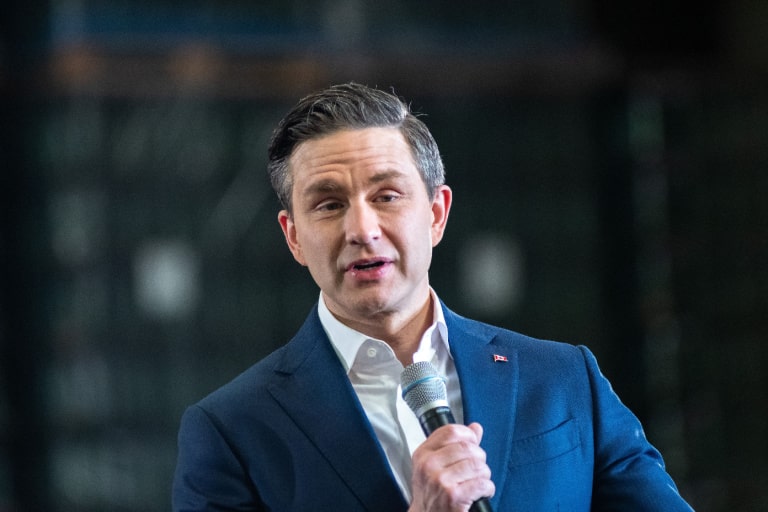
The fact that Carney headed two central banks and led Canadian monetary policy during the global 2008 “once-in-a-century” financial crisis, on one hand, shouldn’t be overstated. Central bankers don’t miraculously attain a number of skills that are vital to have as a Prime Minister.
For example, Carney’s campaigning has revealed a man with a boring personality (even by Canadian standards), while Poilievre has been quite charismatic and demonstrated his ability to connect with people.
That said, can anyone seriously deny that Carney’s experience in the 2008 financial crisis (and arguably, more than just this crisis), distinguishes him from Poilievre, particularly within the context of a historical trade war and a changing political order?
Moreover, if Carney failed to show leadership during the 2008 financial crisis, where is Poilievre’s detailed indictment of Carney on this serious matter?
No such serious critique exists.
In wrapping things up, despite my personal misgivings about Carney, the facts lead to a patently obvious conclusion: when comparing Carney to Poilievre during a Canadian emergency, there is simply no competition.
Carney has a record of demonstrating superior relative judgement.
And so without the slightest hesitation, yours truly will be voting Liberal.
© All Rights Reserved
Aly Kamadia is Editor-In-Chief of iDose Magazine. Kamadia holds an Honors BA & MA in Political Science, both from the University of Waterloo, Canada. He currently serves as Director of Kamadia & Associates. To read selected articles by Kamadia, click here.
